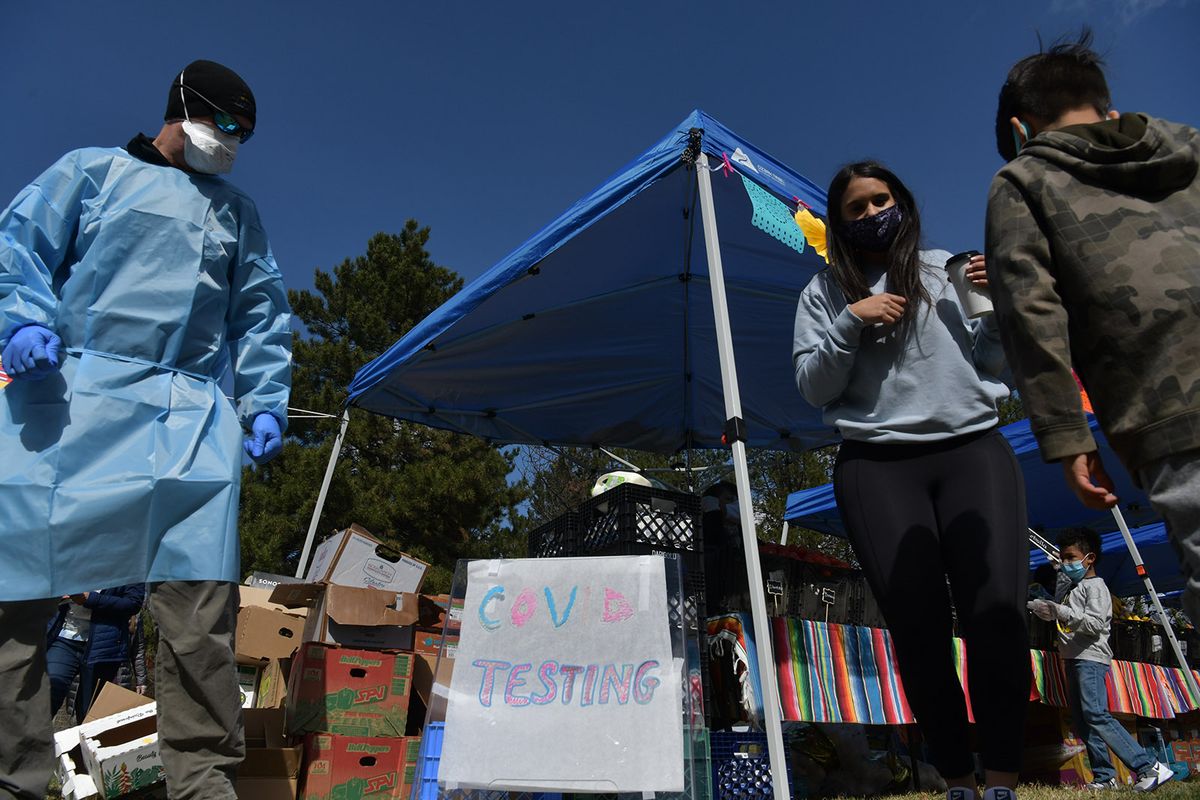El Mercadito is a market and more for Spokane’s Latino community

At first glance El Mercadito might look like a typical neighborhood farmer’s market, but the sea of fresh tomatoes, cilantro, avocados and other foods common in Latin American cuisine are free.
The idea of creating this market was to provide culturally relevant foods for Latino and immigrant families who have been struggling financially, said Jennyfer Mesa, activist and co-founder of Latinos en Spokane, a nonprofit that provides assistance and resources to the Latino community. Food insecurity appears to have doubled during the pandemic.
“El Mercadito caters to Latino and immigrant populations,” Mesa said. “That’s something we’ve never had here and there’s nothing like it.”
The first outdoor market was held on March 27. Future markets are planned for the last Saturday of every month from 11 a.m. to 3 p.m. at A.M. Cannon Park with the help of about 25 volunteers. El Mercadito is an intentional “cultural placemaking” effort to address hunger and lapses in health care within the Latino and immigrant community, Mesa said.
Plans to create El Mercadito arose last year from a conversation between Melissa Stipek, the market’s coordinator, and Mesa after noticing many Latinos needed food. The issue was that the food banks often didn’t offer cultural foods or people were embarrassed to seek help, Stipek said.
“It was important to create a space that felt and looked Latino. There aren’t many places in Spokane where Latinos can feel at home or feel comfortable asking for assistance,” Stipek said. “We’re focused on providing a space where they feel at ease and can make use of available resources.”
The nearest market that offers a space for Latino vendors and community members is in Pasco, which is about two hours away from Spokane.
“I know people that travel from Portland, from Spokane, from Idaho just to go experience that space,” Mesa said. “It’s not like there’s crazy discounts, it’s just a Latino space and we wanted to bring a little bit of that to Spokane, especially during this time.”

Prior to bringing the market outdoors, Latinos en Spokane organizers and volunteers were handling drive-thru events to distribute food and supplies to about 200 families.
Foods available range from nopales, tomatillos, plantains, tortillas and masa that is commonly used to make South American arepas, depending on their availability, Mesa said. Food boxes will still be delivered to families that can’t make it out to the market.
“This is a way to provide economic relief, and markets are really rooted into our Indigenous backgrounds in (Mexico), Central and South America,” Mesa said. “It’s where we go to exchange, to connect, to hear our language.”
The organization has been helping Latinos who want to start small businesses fill out necessary paperwork, cover fees, get licenses and receive the encouragement they may need, Stipek said.
About six local Latino vendors have been cleared and are able to offer their products, ranging from customized cups, artisan jewelry, artwork, vegan candles and handmade soaps, Stipek said.
Lilia Alvarez, a vendor at El Mercadito, never imagined she would own her own business. She began making candles and soaps to pass the time during the pandemic and would occasionally gift them to friends and family.
“I just thought ‘Why not? If other people can make candles, why can’t I?’” Alvarez said. So she used her degree in graphic design from the University of Havana in Cuba, where she’s originally from, to create designs and a website for her business. Her husband helps manage it.
With the help of Latinos en Spokane, Alvarez was able secure the necessary paperwork and licensing to sell her naturally made vegan soy candles and goat milk soaps to the public for the first time.
“That feeling of acceptance gives you the courage to continue your work,” she said. “It was exciting to be among so many familiar faces in El Mercadito, and there is no better gift than that.”
In addition to food and vendors, El Mercadito has live music, informational booths providing vital community information from immigration lawyers and community activists, as well as free health care check-ups, COVID-19 testing and vaccines.
Organizers of El Mercadito have been successful in distributing food to the community, but apprehension of receiving COVID-19 vaccines remain, Stipek said.
“We’re working on ways to incentivize people to take advantage of those health resources available,” she said. “It’s important to provide access to health care where Latinos won’t feel like they might be discriminated against and will receive genuine care.”
Many people still have a fear they’ll receive an expensive health bill in the mail, Stipek said, but organizers are looking for ways to address this and have planned to offer free tacos during the next Mercadito to those who get a free health check-up or receive the vaccine.
“This investment is something that’s needed,” Mesa said. “There’s a long history of excluding immigrants here in the community and we’re working on building trust again while creating a space at the same time.”
Reporter Daisy Zavala translated interviews with Melissa Stipek and Lilia Alvarez from Spanish to English.